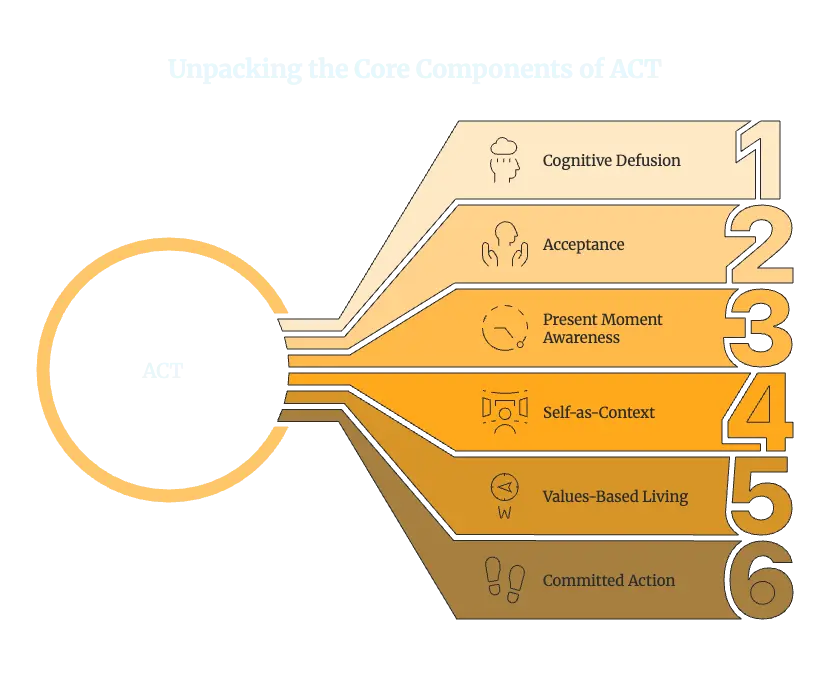What the heck is ACT? When it comes to addiction recovery, we both know it’s not just about quitting—it’s about rebuilding a life that feels worth living. That’s where Acceptance and Commitment Therapy (ACT) comes in. Unlike traditional therapy that focuses on fighting cravings or controlling emotions, ACT helps people accept what they’re feeling while still moving forward. It’s all about finding freedom in the choices you make, even when things get tough.
What is ACT, Really?

ACT or Acceptance and Commitment Therapy is a type of cognitive-behavioral therapy (CBT) that’s all about psychological flexibility—the ability to roll with life’s ups and downs instead of getting stuck in a cycle of avoidance or self-destruction. It’s built on six core ideas:
- Cognitive Defusion – Instead of letting thoughts control you, ACT teaches you to see them as just words and mental noise, not absolute truths.
- Acceptance – Fighting thoughts and emotions takes energy. ACT helps you learn to acknowledge them and move on instead of resisting.
- Present Moment Awareness – Staying in the here and now, rather than spiraling about the past or stressing over the future.
- Self-as-Context – You are more than your thoughts and experiences; ACT helps separate you from that inner critic.
- Values-Based Living – Identifying what really matters to you and making decisions that align with those values.
- Committed Action – Taking real steps toward a meaningful life, even when fear or discomfort shows up.
Why ACT is a Game-Changer in Addiction Recovery
Traditional approaches often push people to “fight” cravings or avoid negative emotions, but let’s be real—that doesn’t always work. In fact, trying to suppress cravings and feelings can make them stronger. ACT takes a different route: instead of struggling against discomfort, it teaches people how to sit with it, accept it, and keep moving toward what really matters. Here’s why that’s a huge deal in addiction recovery:
1. Cravings Lose Their Power
Ever had a craving hit so hard it felt impossible to ignore? ACT helps people realize that cravings are just thoughts and sensations—not commands. Instead of reacting automatically, ACT teaches people to step back and say, “Oh, there’s that craving again,” and let it pass like a wave instead of acting on it.
2. Acceptance = Less Struggle
One of the biggest reasons people relapse is the emotional weight they carry—shame, guilt, anxiety. ACT helps people see that pain is a part of life, but suffering is optional. Instead of trying to avoid or numb pain, ACT teaches people to accept it and still take meaningful action.
3. Life Becomes More Meaningful
Quitting drugs or alcohol is just the start. Recovery is about building a life that makes sobriety worth it. ACT helps people reconnect with their values—whether that’s family, health, creativity, or purpose—and make daily choices that bring them closer to those things.
4. More Flexibility = Fewer Relapses
Rigid thinking fuels addiction: “I already messed up, so I might as well keep using.” “I can’t handle stress without a drink.” ACT challenges these patterns and replaces them with flexibility: “I had a slip, but that doesn’t mean I have to give up.” It’s about adapting and bouncing back instead of spiraling.
How ACT Works in Practice
The cool thing about ACT is that it’s not just talk—it’s hands-on. Therapists use exercises, mindfulness, and real-world strategies to help people shift their thinking and behavior. Some go-to techniques include:
- Mindfulness Training – Simple practices like breathwork, meditation, and sensory exercises to stay grounded in the moment.
- Defusion Techniques – Saying thoughts out loud in a funny voice or writing them down to lessen their intensity.
- Values Discovery – Exercises that help people figure out what truly matters to them.
- Metaphors – Using stories like Passengers on the Bus (where thoughts are passengers, but you’re still the driver) to illustrate key concepts.
Who Benefits from ACT in Addiction Recovery?
Honestly? Almost anyone in recovery. But ACT is especially helpful for:
- People who struggle with cravings and triggers – Instead of fearing them, ACT helps people face them with less reactivity.
- Those dealing with shame or self-judgment – ACT breaks the cycle of beating yourself up and helps you move forward.
- Anyone looking for long-term recovery – It’s not just about quitting; it’s about building a sustainable, fulfilling life.
- People with co-occurring mental health struggles – ACT is great for handling anxiety, depression, and trauma alongside addiction.
Why We Use ACT at Asheville Recovery Center
At Asheville Recovery Center, we believe that recovery isn’t just about sobriety—it’s about creating a life that feels worth staying sober for. That’s why ACT is a core part of our approach. Instead of forcing people to “fix” themselves, ACT helps them accept where they are and take steps toward where they want to be.
If you or someone you love is struggling with addiction, ACT might be the approach that makes a difference. Reach out today to learn more about how Asheville Recovery Center can support your recovery journey.






